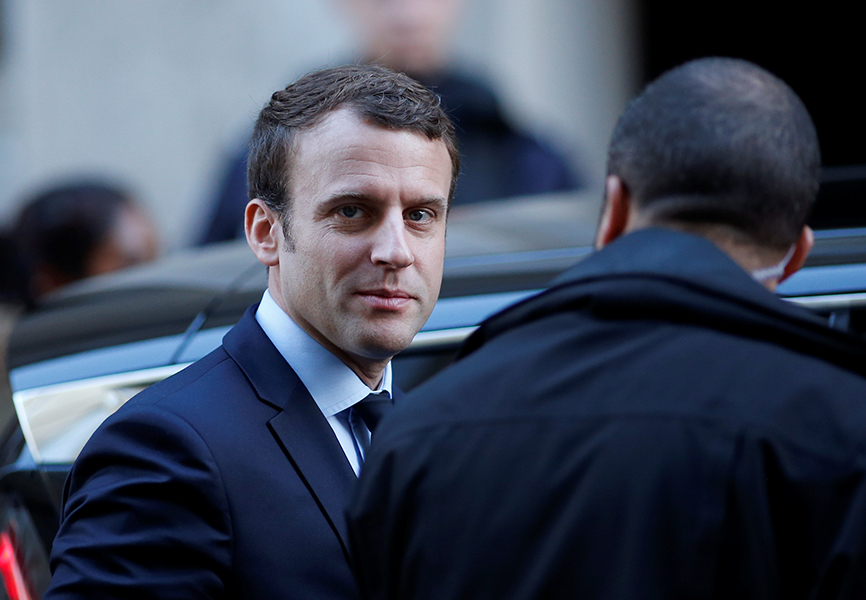Like the former Italian prime minister, the French would-be reformer risks not being able to deliver.He's an insider and an outsider. As a politician, he was incubated by the left but built his stratospheric rise on a challenge to its grandees. He's young, charming and a fan of the EU — the incarnation of the hopes of those yearning for reforms and openness.
That's a description of France's Emmanuel Macron, the centrist candidate for president who will face off against the far-right Marine Le Pen in the second round of the presidential election on May 7.
But the same words could be used to describe Matteo Renzi, the former Italian prime minister whose career underwent a similar rise, only to founder as the country's vested interests closed ranks and derailed his reforms.
Should Macron become president, Renzi's experience should serve as a cautionary tale. The structure of France's Fifth Republic may ensure he stays in power longer than Renzi, but won't keep him from making the same mistakes — or necessarily enable him to deliver on what he has promised.
Macron and Renzi share an ideology which is experiencing something of a revival in Europe. As candidates, both were, somewhat unfairly, accused of preferring slick PR to solid policy. And indeed, neither man's success was built on particularly groundbreaking ideas; their talk of “change” and “progress” risk ringing hollow.
Support for Renzi's reforms gradually faded as their downsides became apparent, alienating left-wing constituencies the most.
After Renzi came to power in an internal party coup, he rode an initial wave of popular support, vividly demonstrated by a historic result in European elections in 2014 for his Democratic Party shortly after he became prime minister.
This victory — and the support of Italians eager for change — gave him the political capital to pursue a program of economic reforms that was ambitious and far-reaching by his country's standards, with the promise of quick returns. But what it didn't do was deliver a cohesive, reform-oriented majority in parliament, and so his momentum quickly dissipated.
Support for his reforms gradually faded as their downsides became apparent, alienating left-wing constituencies the most. Italy's ever-stagnant economy, the refugee crisis and troubles in the banking sector put the nails in the coffin.
Renzi's response – a more populist, anti-EU rhetoric, and a more profligate fiscal policy – failed to revive his fortunes. The country's establishment reared its head and his teetering coalition started to splinter. His biggest and final mistake was to gamble everything on a contentious constitutional change meant to artificially produce stable majorities, giving his frenemies a unique opportunity to hide behind the popular vote.
What can Macron learn from this? Clearly that reforms, however sensible, can lose popular support as soon as the actual efforts and sacrifices they demand become clear. The French would-be reformist has gone out of his way to hide some of these but he has already shown an astute sense of how to rally wider popular demand against vested interests.
The original batch of economic reforms which bore his name was essentially a mishmash of overdue rectifications. Most French have forgotten that it irked regulated professions, but they do remember that it liberalized long-distance bus travel and made cross-country travel simpler and cheaper.
On Europe, Macron risks pushing too far in the opposite direction of Renzi. He has praised the EU throughout his campaign, without providing much detail of how he intends to overcome the imbalances and disagreements which have plagued it for almost a decade. The French will only become more Euroskeptic if their new president does not achieve some symbolic wins fast.
Of course, comparing the Renzi and Macron projects has its limits. One of Renzi's main missions was providing greater stability to Italian politics. Macron's whole movement has been focused on making him president, so he is unlikely to spend much time attacking the country's political setup. While he has promised to reduce the number of MPs, he shouldn't be expected to allow devotion to institutional reform to crash his presidency.
Another potential difference is parliament. Renzi was held back by his own party's majority, its factions and slow processes. It isn't yet clear what majority Macron will have to work with. While he does risk being “badly elected” with a lower-than-expected lead over Le Pen, the moderate section of the French electorate is fickle and may well accept the logic that they should provide the new president with an “En Marche!” majority.
On the other hand, the center-right appears to be maintaining unity despite Sunday's humiliation. There is certainly much for Macron and those to his right to agree on. But there's just as many reasons those in the old-party establishment might want to see him cut down to size.
This piece originally appeared in POLITICO EU
POLITICO EU

 Emmanuel Macron, head of the political movement En Marche !, or Onwards !, and candidate for the 2017 presidential election, leaves his home in Paris, France, May 2, 2017
Emmanuel Macron, head of the political movement En Marche !, or Onwards !, and candidate for the 2017 presidential election, leaves his home in Paris, France, May 2, 2017